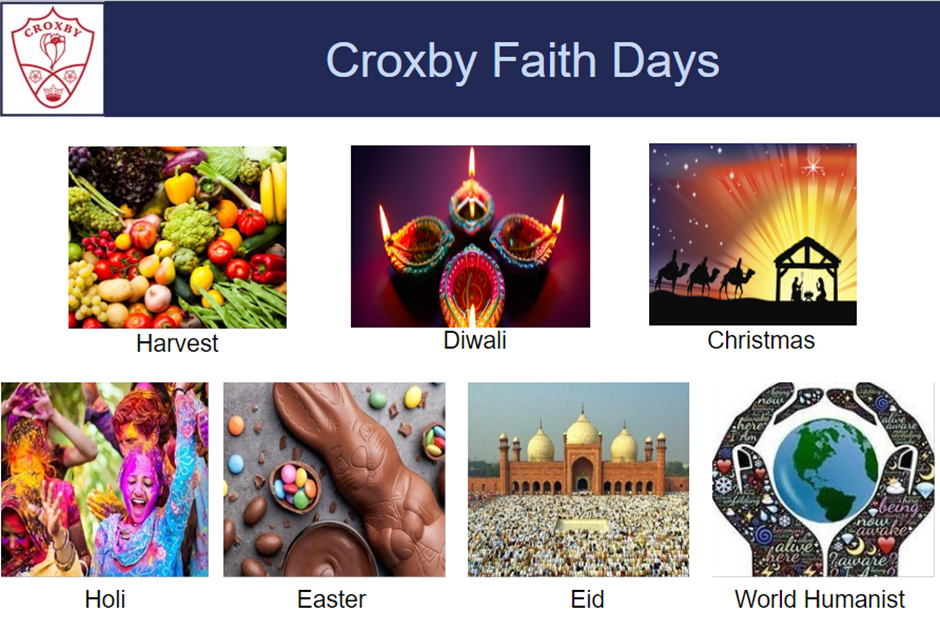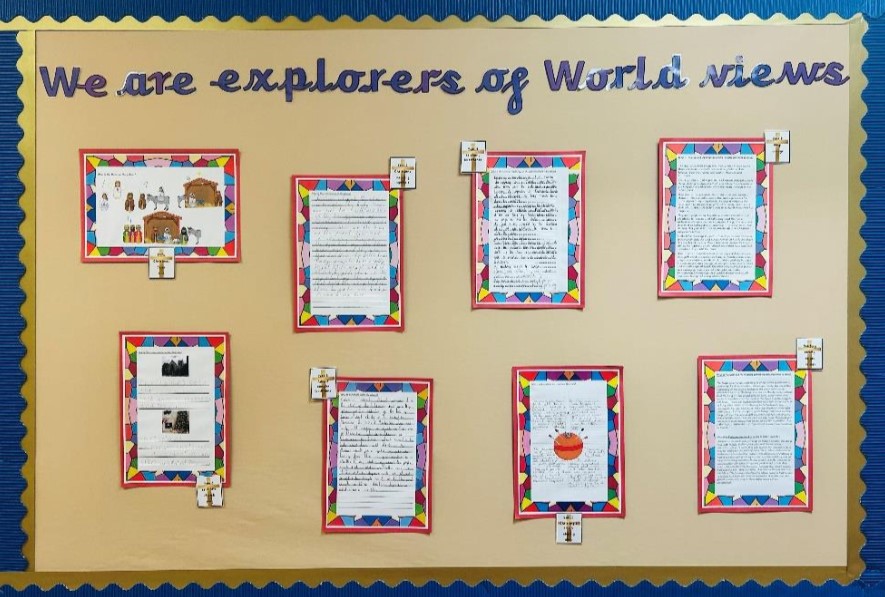RE
At Croxby Primary School we are Explorers of World Faiths!
Intent
At Croxby Primary School, WE ARE EXPLORERS OF WORLD VIEWS!
Our intent is to support our children in developing an outstanding level of religious understanding and knowledge. We aim to do this through engagement with a range of ultimate questions about the meaning and significance of existence. We want our children to ask significant and highly reflective questions about religion and demonstrate an excellent understanding of issues related to the nature, truth and value of religion.
Above all, we want our children to develop a respect for other beliefs and religions and appreciate and celebrate the diverse world in which they live.
We want to equip children with not only the minimum statutory requirements of the Religious Education National Curriculum but to prepare them for the opportunities, responsibilities and experiences of later life.
“The beauty of religion lies in its diversity. We should respect all religions, just as we should respect all people.”
Implementation
Our Religious Education curriculum is based on the expectations of the East Riding and Hull locally agreed syllabus. We have used the syllabus to create a bespoke RE curriculum for our children that is designed to ensure progress and develop interest in our pupils. The syllabus focuses on four main religions: Christianity, Islam, Hinduism and Buddhism also looks at the Humanist approach.
The curriculum for RE aims to ensure that all pupils develop religious literacy through
- Knowing about and understanding a range of religions and worldviews, learning to see these through the disciplines of Theology, Philosophy and Social Sciences.
- Expressing ideas and insights about nature, significance and impact of religion and worldviews through multidisciplinary approach whilst engaging critically with them
- Gaining and deploying skills taken from the disciplines of Theology, Philosophy and Social Sciences to enhance learning about religions and different world views.
Our Religious Education curriculum is based on the expectations of the East Riding and Hull locally agreed syllabus. We have used the syllabus to create a bespoke RE curriculum for our children that is designed to ensure progress and develop interest in our pupils. The syllabus focuses on four main religions: Christianity, Islam, Hinduism and Buddhism also looks at the Humanist approach.
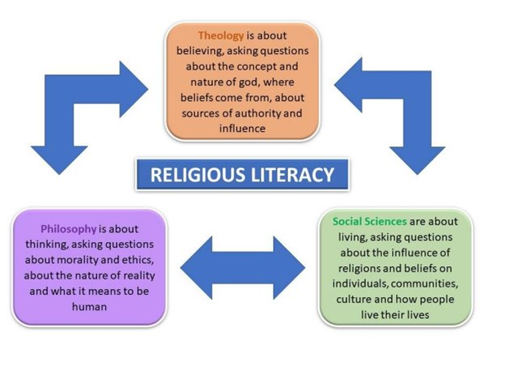
Each year group will have the opportunity to work on an enquiry-based programme of study which develops knowledge and understanding of religious concepts by providing a progressive curriculum which builds upon prior knowledge, skills and understanding previously taught.
* Retrieval practise is planned into the curriculum through spaced learning and interleaving and as part of considered task design by the class teacher. Teaching and learning resources and provided for class teachers so they can focus their time on subject knowledge and task design.
*Explicit Vocabulary is purposefully sequenced into the CUSP curriculum to ensure Tier 2 and 3 vocabulary are explicitly taught along with the etymology and morphology, relevant idioms and colloquialisms to ensure learning sticks. We aim to provide a high challenge with low threat culture and put no ceiling on any child’s learning, instead providing the right scaffolding for each child for them to achieve.
*Misconceptions are challenged carefully and in the context of the substantive and disciplinary knowledge.
Impact
The impact of this curriculum design will lead to outstanding progress over time across key stages relative to a child’s individual starting point and their progression of skills.
HOW DO WE KNOW WHAT CHILDREN HAVE LEARNED?
- Questioning
- Pupil Book Study (talking about learning with the children)
- Talking to teachers
- Low stakes ‘Drop-in’ observations
- Quizzing and retrieval practise
- Live feedback
- Progress in book matches the curriculum intent
Pupils will be taught knowledge, skills and understanding through learning about Christians, Muslims, Hindus, Buddhist and Humanist views. Children will therefore be expected to leave Croxby Primary reaching at least age-related expectations for RE. Our RE curriculum will also lead pupils to be enthusiastic learners, evidenced in a range of ways, including pupil voice and their work.
What is my child learning?
Here is the RE long-term overview
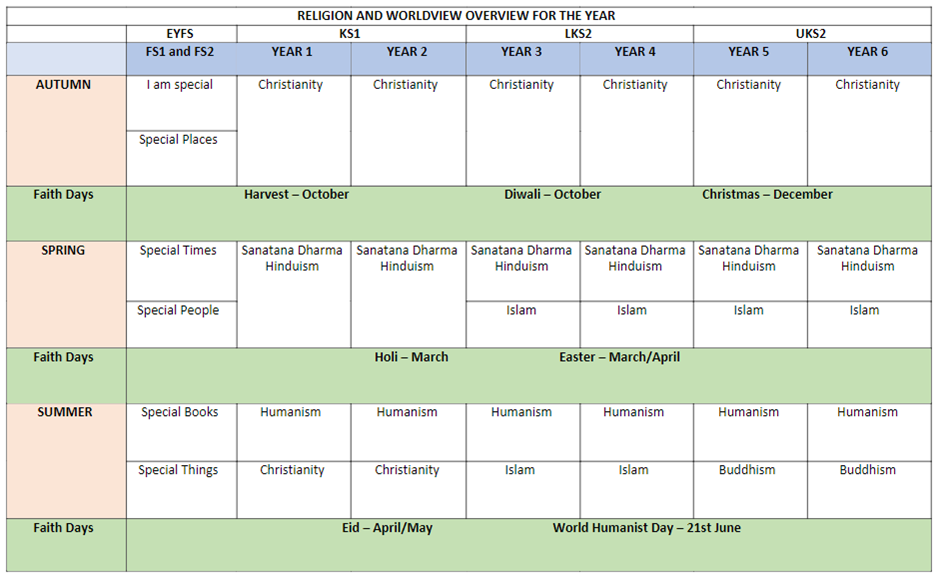
EARLY YEARS
The Early Years Foundation Stage Curriculum supports children’s understanding of Religious Education through the planning and teaching of ‘Understanding the World’. Children are encouraged to use their imagination and curiosity to develop their appreciation of, and wonder at, the world in which they live. Exploring others’ views, cultures and beliefs supports children in developing their views and beliefs about themselves, their family and community. In finding out about others, young children are encouraged to reflect on belief, culture and practice and explore faith through observing festivals and celebrations, sharing stories, visuals, toys, and puppets, handling real artefacts, roleplay, books and discussion.
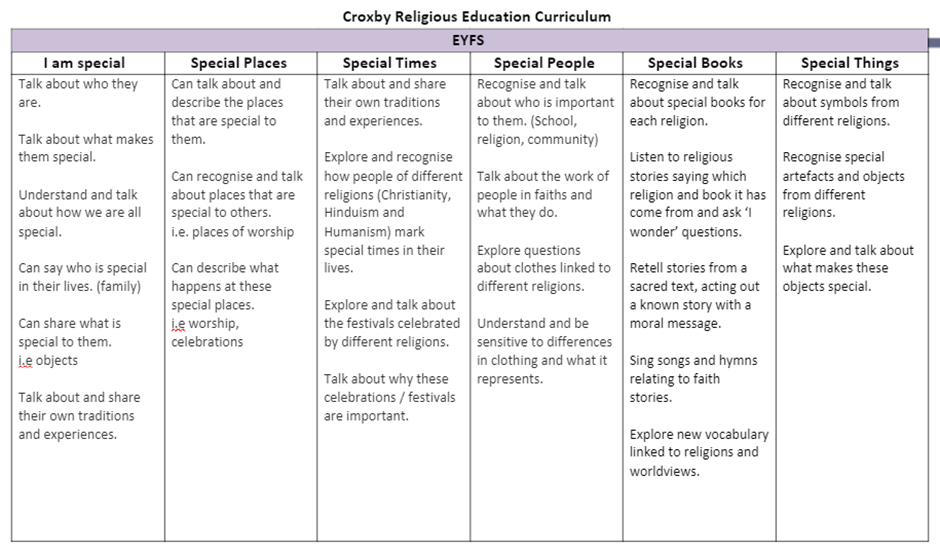
KEY STAGE 1
Pupils in key Stage 1 should develop their knowledge and understanding of religious and non-religious worldviews, recognising their local, national and global contexts. They should use subject specific vocabulary. They should raise questions and begin to express their own views in response to the material they learn about and in response to questions about their ideas. In Key Stage 1, pupils should be taught knowledge, skills and understanding through learning about Christian, Muslim, and Hindu beliefs.
KEY STAGE 2
Pupils should extend their knowledge and understanding of religious and non-religious worldviews, recognising their local, national, and global contexts. They will be introduced to an extended range of sources and subject specific vocabulary. Children will be encouraged to be curious and to ask increasingly challenging questions about religion, belief, values, and human life. Pupils will learn to express their own ideas in response to the material they engage with, identifying relevant information, selecting examples, and giving reasons to support their ideas and views.
Faith Days
Below are a variety of faith days we celebrate whole school to further enrich our RE curriculum.
